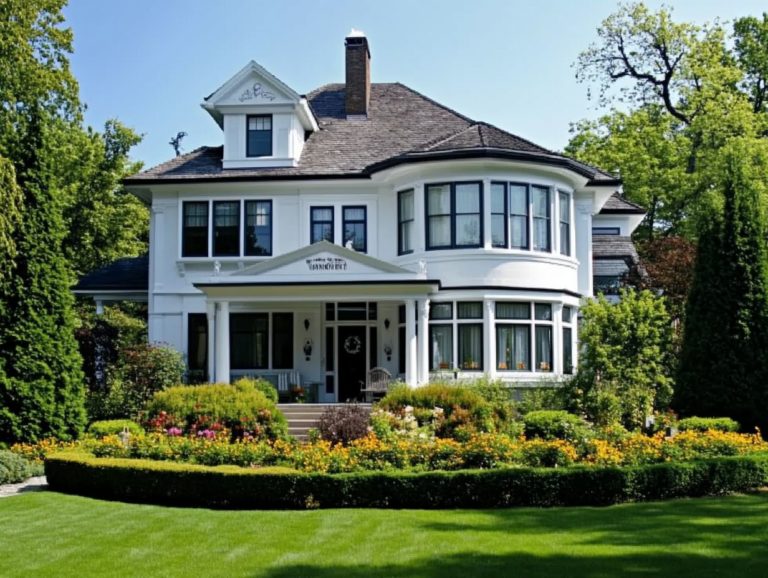5 Unique Offerings from Home Insurance Providers
When it comes to safeguarding your home, a standard insurance policy may not fully address all your needs.
With a range of options at your disposal, it’s crucial to delve into unique offerings that can enhance your coverage.
From bundled plans that save you money to specialized coverage for high-value items, this exploration will unveil five standout features that every homeowner should consider.
You’ll also gain insights into factors that affect premiums, common exclusions, and savvy tips to save on your policy.
Prepare to discover how to secure your home and attain that coveted peace of mind!
Contents
- Key Takeaways:
- 1. Bundled Coverage Options
- 2. Specialized Coverage for High-Value Items
- 3. Discounts for Home Security Systems
- 4. Coverage for Home-Based Businesses
- 5. Additional Living Expenses Coverage
- What Should Homeowners Consider When Choosing a Home Insurance Provider?
- Frequently Asked Questions
- What are some unique offerings from home insurance providers?
- Do all home insurance providers offer coverage for natural disasters?
- What is identity theft protection coverage?
- Is pet liability coverage necessary for homeowners?
- What does home equipment breakdown coverage include?
- What is green home coverage?
Key Takeaways:

- Home insurance providers offer bundled coverage options, allowing homeowners to combine their home and auto insurance for potential savings and convenience.
- High-value items such as jewelry, fine art, and antiques can be insured separately with specialized coverage from home insurance providers, giving homeowners peace of mind.
- Home insurance providers often offer discounts for home security systems, encouraging homeowners to invest in added protection for their property.
1. Bundled Coverage Options
Bundled coverage options for homeowners insurance are becoming increasingly popular in California. They allow you to combine various insurance products for enhanced savings and simplified management.
This simplifies your search for the best homeowners insurance from top providers like USAA, Liberty Mutual, and Nationwide.
By choosing to combine your home insurance with auto or earthquake policies, you unlock significant cost savings, as many insurers offer substantial discounts for multiple policies.
This strategy alleviates the hassle of juggling several individual policies and provides broader coverage that addresses different risks.
For instance, as a California resident, you can take advantage of offerings like earthquake coverage from providers such as The Hartford. Understanding the top 5 types of home insurance policies is essential given the state’s seismic activity.
This bundling strategy provides peace of mind, knowing that various aspects of your insurance needs are protected under a single umbrella.
2. Specialized Coverage for High-Value Items
Homeowners insurance policies often require specialized coverage for high-value items, ensuring that your treasured possessions be it jewelry, art, or collectibles are adequately protected.
This specialized coverage is essential, as standard policies may impose limits on the amount reimbursed for these items, particularly in the unfortunate event of damage, loss, or theft. The extent of coverage can vary significantly based on your property’s location; for instance, areas prone to natural disasters often face higher premiums for valuable items due to the increased risk involved.
Take fine art from local galleries, vintage watches, or rare coins, for example they typically need extra riders, which are additions to your policy that give extra coverage, to extend protection.
To secure this tailored insurance, start by appraising your high-value items. Then, consult with insurance agents who specialize in these coverages to find a policy that comprehensively meets your needs.
3. Discounts for Home Security Systems
Many homeowners insurance companies recognize the value of home security systems and offer substantial discounts for properties equipped with them, acknowledging the reduced risk of theft and damage these systems provide.
These security systems can vary widely, from fundamental features like deadbolts and smoke alarms to sophisticated surveillance cameras and smart home technology that enables you to monitor your property from anywhere.
By investing in these systems, you enhance your safety and have the potential to save hundreds of dollars annually on your insurance premiums.
It s essential to compare quotes from different insurance providers to understand how these discounts can influence your overall policy costs. With some careful research, you can uncover the best options tailored to your specific needs, maximizing your savings while ensuring you have robust coverage.
4. Coverage for Home-Based Businesses

As you start your home-based business, it’s vital to understand your coverage options. This will help protect both your personal and business assets.
Standard homeowners insurance often falls short for home businesses. While your personal property may be covered, your business equipment and inventory usually aren’t.
To fill these gaps, consider endorsements to enhance your coverage for specific business-related assets. Alternatively, exploring a separate business owner’s policy can offer comprehensive liability and property coverage tailored to the distinct needs of your home-based operations.
Being proactive gives you peace of mind and financial security as you build your business.
5. Additional Living Expenses Coverage
Additional living expenses coverage is an important part of many homeowners insurance policies. It provides financial support for temporary housing and related costs when your home becomes uninhabitable.
This coverage typically kicks in during situations like fire, severe water damage, or natural disasters, requiring you to vacate your residence.
For instance, if a burst pipe floods your home and makes it unlivable, this insurance can cover hotel stays, meals, and even transportation. This helps ease the financial strain during what is undoubtedly a stressful time.
Different insurance providers may have varying limits on this coverage or specific terms outlining how long you can access these benefits. Companies like State Farm and Allstate, for example, might offer a higher cap for living expenses compared to some regional insurers.
This makes it crucial for you to carefully compare your options and fully understand the specifics of each policy to ensure you have the protection you need.
What Should Homeowners Consider When Choosing a Home Insurance Provider?
When selecting a home insurance provider, consider several critical factors, such as the company’s reputation, customer experience, claims history, and average cost of premiums. Understanding the key features of comprehensive home insurance can also significantly influence the overall value of your homeowners insurance policy.
By evaluating these aspects, you can ensure your coverage meets your needs while staying within your budget. For example, comparing customer service ratings often reveals how responsive a provider is to inquiries or issues.
Examining claims handling practices offers insight into how seamless and fair the process is during stressful times. Satisfaction surveys from reputable organizations like AM Best and JD Power provide valuable benchmarks.
These evaluations are essential tools, giving you the power to make informed decisions that protect your most significant investment.
What Are the Different Types of Home Insurance Coverage?
Homeowners insurance offers a range of coverage types tailored to protect you from various risks, including dwelling coverage, personal property coverage, liability coverage, and additional living expenses.
Dwelling coverage acts as a safeguard for the physical structure of your home, protecting it from hazards like fire, theft, and vandalism. This ensures that you can manage repairs or rebuilding without feeling the financial strain.
Personal property coverage extends this protection to the items inside your home, such as furniture and electronics. This coverage is crucial if you reside in areas prone to earthquakes and wildfires.
Liability coverage provides you with a safety net, shielding you from financial responsibility should someone get injured on your property. This type of coverage helps you if someone is injured on your property. It can save you from hefty medical bills.
In California, where natural disasters like mudslides and wildfires are common, it’s wise to consider additional options, such as earthquake insurance and enhanced wildfire coverage. These specialized coverages address the unique risks you face as a homeowner in this region, making them critical for comprehensive protection.
Common Exclusions in Home Insurance Policies You Should Know

While homeowners insurance offers extensive coverage, it often comes with common exclusions. To save money, consider exploring 5 ways to lower home insurance rates. You need to be aware of damage from natural disasters like floods and earthquakes unless you opt for additional coverage.
Understanding these limitations is especially crucial in a state like California, where these risks are more prevalent.
Other typical exclusions include damage from pests, wear and tear, and mold. These can lead to significant financial burdens if left unaddressed.
It’s important to identify what your policy lacks and consider additional coverage options for these excluded risks.
For example, you can acquire flood insurance through the National Flood Insurance Program. Specialized carriers offer earthquake insurance. Ensuring adequate coverage can grant you peace of mind and financial stability when facing unexpected incidents.
How Homeowners Can Save Money on Their Insurance
You can save money on homeowners insurance by comparing quotes from various providers and actively seeking out discounts.
Bundling multiple insurance policies, like auto and home coverage, can yield significant savings.
Implementing home safety measures, such as installing security systems or smoke detectors, often qualifies you for discounts from many insurers.
Regularly reviewing your policies and updating your coverage as needed is also essential. Take the time to seek competitive quotes to uncover better deals.
Ensure you’re not overspending on essential protection while still enjoying comprehensive coverage for your property.
Factors That Affect Home Insurance Premiums
Several factors determine your home insurance premiums. These include the location of your property, the risk of natural disasters, your claims history, and the overall condition of your home.
These elements interconnect to form a comprehensive picture of risk that insurers assess.
If your home is in California, an area prone to wildfires and earthquakes, you might face significantly higher premiums due to this exposure.
A history of multiple claims can lead to higher costs. An older home, especially one lacking meticulous maintenance, can also contribute to elevated premiums.
By understanding how these factors intertwine, you can empower yourself to make informed decisions about your coverage.
Lesser-Known Benefits Offered by Home Insurance Providers
Many homeowners insurance providers offer a treasure trove of lesser-known benefits that can enhance the value of your policy. It’s important to consider key features to look for in home insurance providers such as identity theft protection, home sharing coverage, and coverage for your most valuable items.
These features provide significant security, especially in today s digital landscape where identity theft is common.
Having identity theft protection can ease the burden of navigating a financial crisis. You’ll have support to help recover your identity and finances.
As more people dive into home sharing through platforms like Airbnb, specialized coverage becomes vital to safeguard against potential liabilities and property damage.
Don’t forget to check for these benefits of home insurance! Not all insurance providers offer them, but some stand out by tailoring their policies to include such options.
Take the time to shop around and compare offerings to ensure you have optimal protection.
Frequently Asked Questions

What are some unique offerings from home insurance providers?
Some unique offerings from home insurance providers include coverage for natural disasters, identity theft protection, pet liability coverage, home equipment breakdown coverage, and ways to customize your home insurance policy.
Review your policy today to ensure you have the coverage you need!
Do all home insurance providers offer coverage for natural disasters?
No, not all home insurance providers offer coverage for natural disasters. Don t wait! Research your options now to ensure you re covered, especially if you live in an area prone to these events.
What is identity theft protection coverage?
Identity theft protection helps safeguard your finances if someone steals your personal information and uses it fraudulently. It s a critical feature offered by some home insurance providers.
Is pet liability coverage necessary for homeowners?
While not mandatory, pet liability coverage is a smart choice for homeowners with pets. It protects you if your furry friend causes injury or damages someone else’s property.
What does home equipment breakdown coverage include?
Home equipment breakdown coverage covers the cost of repairing or replacing household appliances and systems that break down due to mechanical or electrical failure. This includes items like your HVAC system, refrigerator, or washing machine.
What is green home coverage?
Green home coverage helps cover the cost of repairing or replacing eco-friendly features in your home, such as solar panels or energy-efficient appliances. This specific coverage is offered by some home insurance providers.






